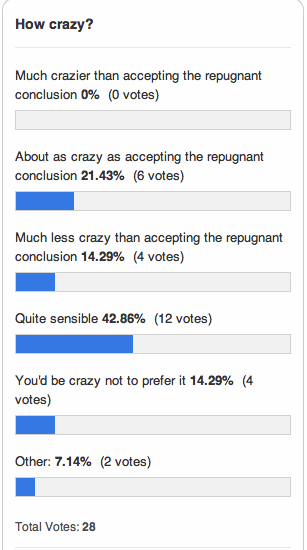She asked how uncle Freddie was doing. The past few days have been quite bad for him, I said. He was killed by a bus just over a month ago. The first few weeks nothing good happened that he would have missed, but he really would have liked it when the cousins visited. We are thinking about cancelling the wedding. He really would have wanted to be there and the deprivations are getting to be a bit much.
This is a quote from Ben Bradley via Clayton Littlejohn‘s blog. Commenters there agree that postponing the wedding will not help Freddie, but their suggestions about why seem quite implausible to me.
This is really no different to if Freddy was alive but couldn’t come to the wedding because he was busy. Would it be better for him if we cancel it entirely so he wouldn’t be able to come in any case? I hope it is clear enough here that the answer is no. His loss from failing to attend is the comparison between a world where he could attend and the real world. Changing to a different real world where he still can’t attend makes no difference to him in terms of deprivation. This doesn’t involve the controversial questions about how to treat non-existent people. But I think in all relevant ways it is just the same as dead Freddy’s problem.
The apparent trickiness or interestingness of the original problem seems to stem from thinking of Freddy’s loss as being some kind of suffering at some point in time in the real world, rather than a comparison between the real world and some counterfactual one. This prompts confusion because it seems strange to think he is suffering when he doesn’t exist, yet also strange to think that he doesn’t bear some cost from missing out on these things or from being dead.
But really there is no problem here because he is not suffering in the affective sense, the harm to him is just of missing out. It would indeed be strange if he suffered ill feelings, but failing to enjoy a good experience seems well within the capacity of a dead person. And as John Broome has elaborated before – while suffering happens at particular times, harms are comparisons between worlds, perhaps of whole lives, so don’t need to be associated with specific times. My failure to have experienced a first time bungie jumping can’t usefully be said to have occurred at any particular moment, yet it is quite clear that I have failed to experience it. You could say it happens at all moments, but one can really only expect a single first bungie jump, so I can’t claim to suffer from the aggregate loss of failing to experience it at every moment.
You might think of the failure as happening at different moments in different comparisons with worlds where I do bungie jump at different times. This is accurate in some sense, but there is just no need to bother differentiating all those worlds in order to work out if I have suffered that cost. And without trying to specify a time for the failure, you avoid any problems when asked if a person who dies before they would have bungie jumped missed out on bungie jumping. And it becomes easy to say that Freddy suffered a cost from missing the wedding, one that cannot be averted by everyone else missing it too.
***
P.S. If you wonder where I have been lately, the answer is mostly moving to Pittsburgh, via England. I’m at CMU now, and trying to focus more on philosophy topics (my course of study here). If you know of good philosophy blogs, please point them out to me. I am especially interested in ones about ideas, rather than conference dates and other news.




